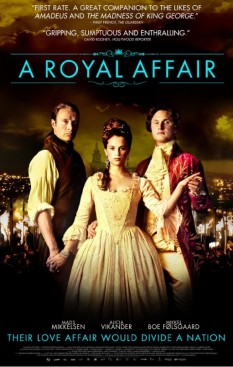
 A Royal Affair (En kongelig affære) (IMDB) is a history-based costume drama from Denmark. It is reminiscent of one of those high-minded English historical dramas like The Young Victoria, but being Danish it is darker and more depressing. Its main lesson is that life in the 18th century was pretty grim even for members of the upper crust, and worse for everyone else. That’s probably a fair statement but it doesn’t necessarily make a fun movie.
A Royal Affair (En kongelig affære) (IMDB) is a history-based costume drama from Denmark. It is reminiscent of one of those high-minded English historical dramas like The Young Victoria, but being Danish it is darker and more depressing. Its main lesson is that life in the 18th century was pretty grim even for members of the upper crust, and worse for everyone else. That’s probably a fair statement but it doesn’t necessarily make a fun movie.
In 1766 the English princess Caroline Matilda (Alicia Vikander) is married at the age of 15 to Christian VII, King of Denmark (Mikkel Boe Følsgaard). He is young, handsome and fun-loving. Unfortunately he is also quite mad. Caroline Matilda is soon fed up with him and with her stultifying life in the Danish court. Denmark in those days was an even more backward and repressive country than England.
Things start to look up for her when the king gets a new personal physician. Johann Friedrich Struensee (Mads Mikkelsen) is a German doctor who is secretly a fan of the philosophers of the French Enlightenment (whose works are of course banned in Denmark.)
Under Struensee’s care Christian’s condition begins to improve. The king has always been a puppet of the aristocratic Privy Council. He now begins to stand up for himself and ends up dismissing the Council. He announces his intention to rule in his own right, advised by Struensee.
Christian signs a series of decrees drafted by Struensee which enact a large number of liberal reforms, briefly making Denmark a beacon of the Enlightenment.
Perhaps unsurprisingly, Queen Caroline Matilda falls in love with the dynamic doctor and the two begin a tempestuous and ill-concealed affair.
The movie follows the historical record pretty closely–but this is a historical record most American viewers will know nothing about, so my remaining comments should probably be considered spoilers. If you intend to see the movie you might want to stop reading here.
As portrayed in the movie, Christian VII seems none too bright, but he does not appear to be insane. He is lucid and non-delusional. However he is childish, naive, impulsive, emotional and above all extremely lonely. Maybe he is just the victim of a bad upbringing by courtiers who wanted a pliant king.
He responds to Struensee mainly because the doctor is the first person to treat him as a normal human being. He becomes so attached to Struensee that he would have done anything for him–even forgive the affair.
However Struensee’s feelings of guilt make it impossible for him to continue to work with Christian. He pushes Christian aside, excluding him from the government and signing decrees in his own name. Christian, deprived of his only friend, sinks into a deep depression.
This gives the defenders of the old order their chance. They spark a popular uprising by publicizing the affair and suggesting that the king is being held prisoner. Christian is too depressed to defend his friend and is manipulated into signing an order for his arrest.
All this suggests a classical tragedy in whih Struensee could have succeeded with his reforms if he had just been able to keep his pants zipped. (OK, “buttoned” since the zipper hadn’t been invented yet.) This is questionable on a number of grounds.
For one thing, many historians believe that Christian VII suffered from schizophrenia and was catatonic toward the end, leaving Struensee no choice but to rule without him. Without Christian’s public backing a program of radical reforms would have had little chance of long-term success. Also the public may have been even more outraged by the fact that Struensee was German than by the fact that he was sleeping with the Queen.
Still, if you are interested in history this movie does a good job of illuminating a dramatic and mostly-forgotten historical incident.

